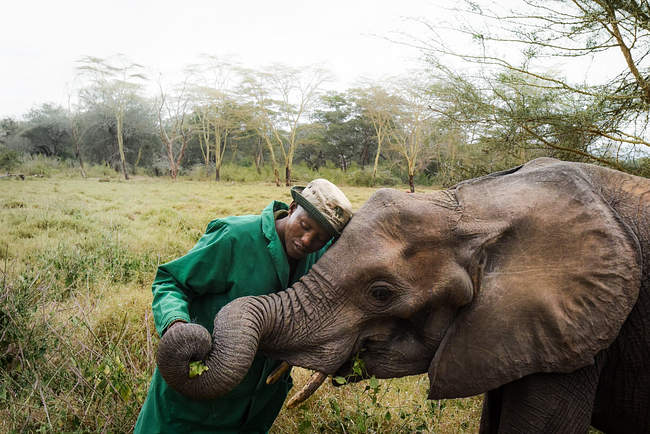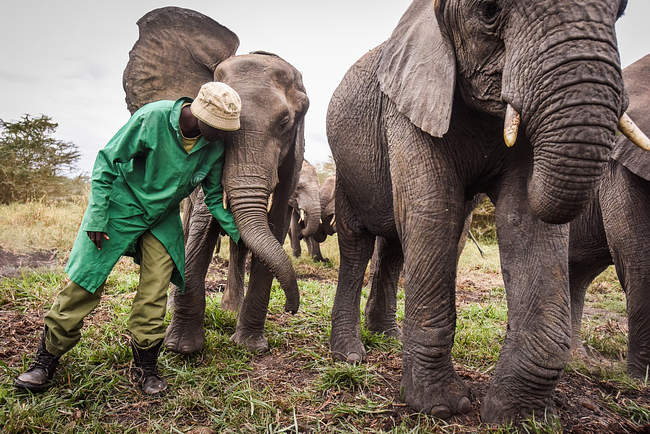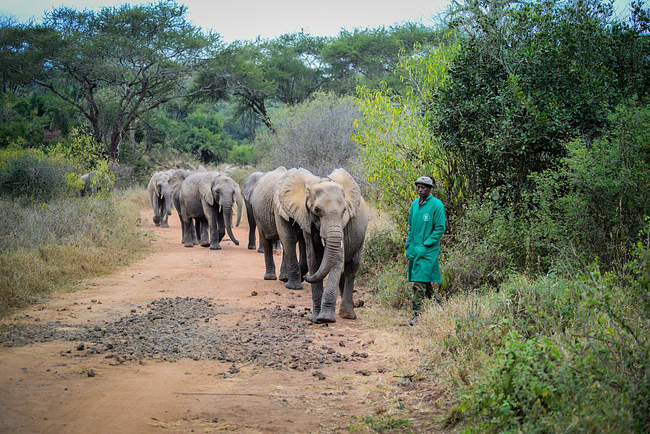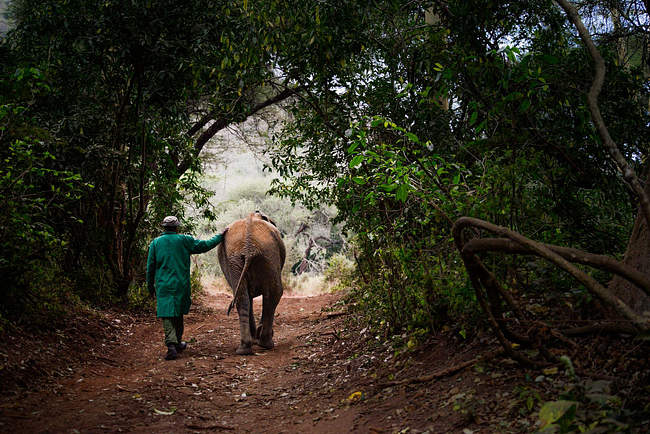Shukuru was moved to our Umani Springs Reintegration Unit on 16th June 2018 from our Nairobi Nursery, after having been brought back from our Ithumba Unit in order to convalesce and benefit from intensive medical attention. This was in an effort to get topside of her chronic health issues which have been plaguing her over the years.
When Shukuru arrived in Umani Springs within the beautiful Kibwezi ground water forest she appeared perplexed by this entirely new place given that she probably thought she was returning to Ithumba when she was first loaded into the back of the elephant transporter truck in the early morning hours six weeks ago. Our Umani Springs Unit seemed the obvious place for Shukuru given her medical history at Ithumba, with its plentiful food, water and the favorable Kibwezi forest environment which forms part of the picturesque Chyulu Hills National Park ecosystem, we felt sure that this gentle peaceful place would be a good new home for Shukuru.
Six weeks after she moved here we have seen positive change in her condition. We are pleased to report that she is improving week on week, growing stronger and more confident within her new surroundings and the Umani orphans have been extremely patient, determined to see Shukuru comfortably integrated into their midst. A close bond has been formed with Lima Lima who is persistent in her efforts to become Shukuru’s friend, and Sonje and Murera who Shukuru must remember from her Nursery years have welcomed her warmly too.

It is always a great privilege to ‘lead’ the herd, to their browsing fields in the morning and then later to the midday milk feed and mud bath, and late in the day back to their night stockades, and in recent weeks we have seen Shukuru take on that role, with all the other Umani orphans falling in behind her. This is not altogether unsurprising because despite her diminutive size, due to her chronic health setbacks, Shukuru is the same age as the oldest orphan at our Umani Springs Reintegration Unit, Murera.
The Umani Keepers, particularly Amos and Adan, are absolutely determined that Shukuru will thrive in her new home and they have singled her out for special attention all day every day. She is naturally growing very close to these men who provide her with abundant love and watch over her with such care and compassion, dogged in their efforts to see her heal in the fullness of time, and grow to be fat and healthy, just like all the other orphans at Umani and she is certainly responding well to their hard work.
The Kibwezi Forest
Ten years ago The David Sheldrick Wildlife Trust signed a public-private partnership concession with the Kenya Forest Service to oversee the full management and protection of this beautiful ground water forest. One of our first initiatives was to fence the perimeter of the forest into the Chyulu Hills National Park, leaving the boundary adjacent to the Park open to enable the free movement of wildlife between the Park and the forest. This haven is now home to our third and most recent Reintegration Unit, formed specifically to accommodate some of our more compromised orphaned elephants.

Our first elephants to inhabit the unit were Murera and Sonje, both inflicted with permanent injuries from poaching, yet they are healthy and mobile enough to live perfectly viable wild lives in favorable conditions, conditions that do not require them to walk huge distances in search of food. Since their arrival other compromised orphans have been moved here always together with their friends, so Umani is made up of some mainly perfectly healthy orphans, along with some of our invalid cases.
Within the forest, looking out onto waterholes scattered on an open glade, the DSWT has built the stylish Umani Springs Lodge, a place where guests can stay and enjoy this unique and picturesque place. All the funds from visitors staying in this facility off-set the operational costs to protect the Kibwezi Forest, funding the concession fees, the daily patrolling and maintenance costs of the now 93 km northern boundary electrical fenceline of Kibwezi Forest, which DSWT has now further extended along the Chyulu Hills National Park boundary bordering the community, and two De-Snaring Teams based within the ecosystem. These teams and their constant presence ensures that all illegal activities from charcoal burning, to cutting down of hard wood trees, and any poaching activities are prevented.










